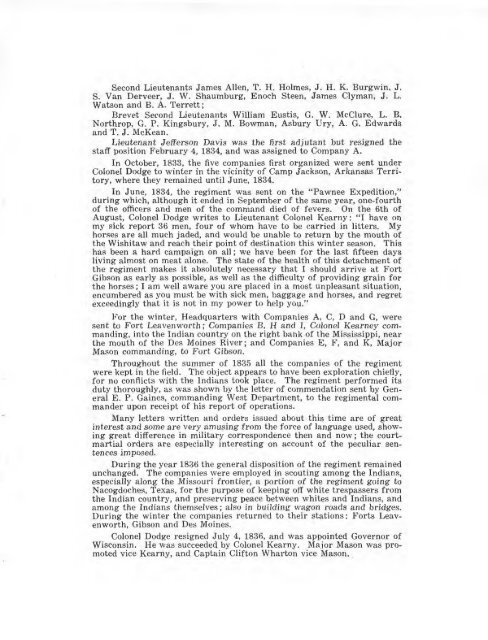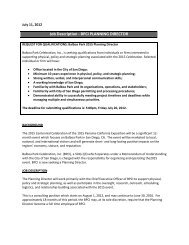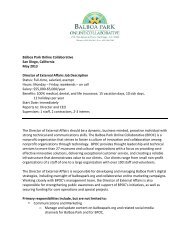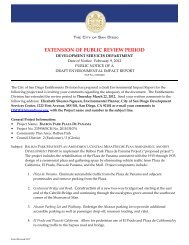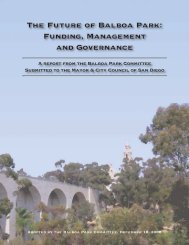Army and Navy Review 1915 Panama-California Edition - Balboa Park
Army and Navy Review 1915 Panama-California Edition - Balboa Park
Army and Navy Review 1915 Panama-California Edition - Balboa Park
Create successful ePaper yourself
Turn your PDF publications into a flip-book with our unique Google optimized e-Paper software.
Second Lieutenants James Allen, T. H. Holmes, J. H. K. Burgwin, J,<br />
S. Van Derveer, J. W. Shaumburg, Enoch Steen, James Clyman, J. L,<br />
Watson <strong>and</strong> B. A. Terrett;<br />
Brevet Second Lieutenants William Eustis, G. W. McClure, L. B.<br />
Northrop, G. P. Kingsbury, J. M. Bowman, Asbury Ury, A. G. Edwards<br />
<strong>and</strong> T. J. McKean.<br />
Lieutenant Jefferson Davis was the first adjutant but resigned the<br />
staff position February 4, 1834, <strong>and</strong> was assigned to Company A.<br />
In October, 1833, the five companies first organized were sent under<br />
Colonel Dodge to winter in the vicinity of Camp Jackson, Arkansas Territory,<br />
where they remained until June, 1834.<br />
In June, 1834, the regiment was sent on the “Pawnee Expedition,”<br />
during which, although it ended in September of the same year, one-fourth<br />
of the officers <strong>and</strong> men of the comm<strong>and</strong> died of fevers. On the 6th of<br />
August, Colonel Dodge writes to Lieutenant Colonel Kearny: “I have on<br />
my sick report 36 men, four of whom have to be carried in litters. My<br />
horses are all much jaded, <strong>and</strong> would be unable to return by the mouth of<br />
the Wishitaw <strong>and</strong> reach their point of destination this winter season. This<br />
has been a hard campaign on a ll; we have been for the last fifteen days<br />
living almost on meat alone. The state of the health of this detachment of<br />
the regiment makes it absolutely necessary that I should arrive at Fort<br />
Gibson as early as possible, as well as the difficulty of providing grain for<br />
the horses; I am well aware you are placed in a most unpleasant situation,<br />
encumbered as you must be with sick men, baggage <strong>and</strong> horses, <strong>and</strong> regret<br />
exceedingly that it is not in my power to help you.”<br />
For the winter, Headquarters with Companies A, C, D <strong>and</strong> G, were<br />
sent to Fort Leavenworth; Companies B, H <strong>and</strong> I, Colonel Kearney comm<strong>and</strong>ing,<br />
into the Indian country on the right bank of the Mississippi, near<br />
the mouth of the Des Moines River; <strong>and</strong> Companies E, F, <strong>and</strong> K, Major<br />
Mason comm<strong>and</strong>ing, to Fort Gibson.<br />
Throughout the summer of 1835 all the companies of the regiment<br />
were kept in the field. The object appears to have been exploration chiefly,<br />
for no conflicts with the Indians took place. The regiment performed its<br />
duty thoroughly, as was shown by the letter of commendation sent by General<br />
E. P. Gaines, comm<strong>and</strong>ing West Department, to the regimental comm<strong>and</strong>er<br />
upon receipt of his report of operations.<br />
Many letters written <strong>and</strong> orders issued about this time are of great<br />
interest <strong>and</strong> some are very amusing from the force of language used, showing<br />
great difference in military correspondence then <strong>and</strong> now; the courtmartial<br />
orders are especially interesting on account of the peculiar sentences<br />
imposed.<br />
During the year 1836 the general disposition of the regiment remained<br />
unchanged. The companies were employed in scouting among the Indians,<br />
especially along the Missouri frontier, a portion of the regiment going to<br />
Nacogdoches, Texas, for the purpose of keeping off white trespassers from<br />
the Indian country, <strong>and</strong> preserving peace between whites <strong>and</strong> Indians, <strong>and</strong><br />
among the Indians themselves; also in building wagon roads <strong>and</strong> bridges.<br />
During the winter the companies returned to their stations: Forts Leavenworth,<br />
Gibson <strong>and</strong> Des Moines.<br />
Colonel Dodge resigned July 4, 1836, <strong>and</strong> was appointed Governor of<br />
Wisconsin. He was succeeded by Colonel Kearny. Major Mason was promoted<br />
vice Kearny, <strong>and</strong> Captain Clifton Wharton vice Mason.


